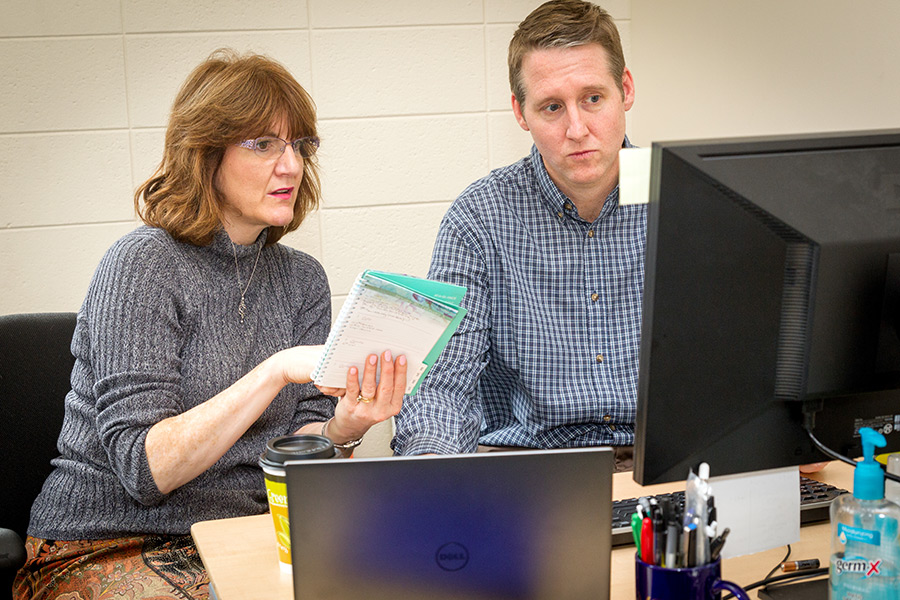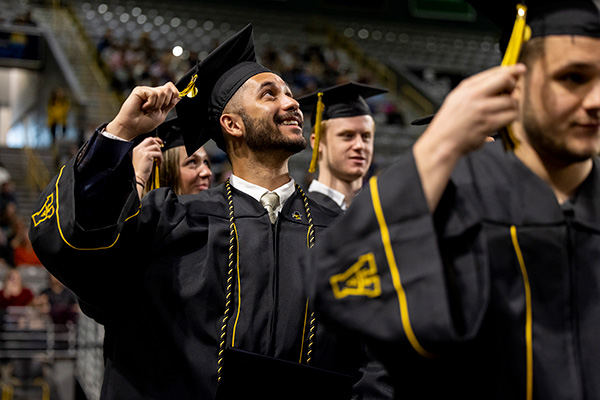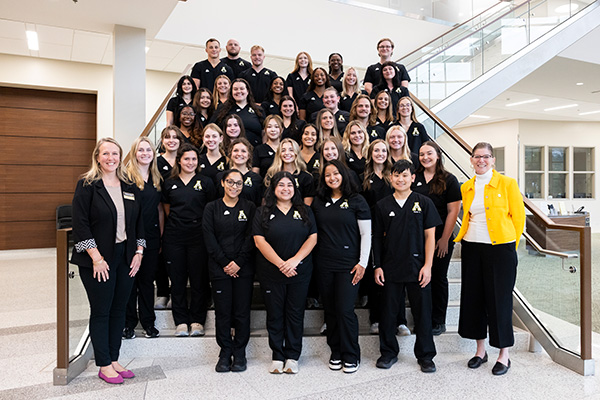
Emory Maiden III, an instructional technology consultant in the Center for Academic Excellence at Appalachian State University, helps Dr. Kellie Reed Ashcraft imbed a Zoom video conferencing feature into AsULearn. Ashcraft is an associate professor in Appalachian’s Department of Social Work. Photo by Marie Freeman
BOONE, N.C.—Dr. Sandi Lane, an assistant professor in the health care management program at Appalachian State University, recently taught a fully online course for the first time. She did so after working with on-campus experts to design an effective course that covers content in an engaging way.
“For me, teaching online is now less about wrestling with technology and more about rethinking how to educate students,” Lane said. “Students from all across the state can continue their education and grow their career without leaving their current job. We use video conferencing for team meetings so no student feels as if they’re working alone.”
Dr. Cole Edwards, an assistant professor in Appalachian’s Department of Geology, wants to take his undergraduate students on a summer trip to Bermuda, where they will study coral reefs. He has taken a couple of workshops that will help him do that: one on the logistics of study abroad, the other on the health and safety of students overseas.
“These workshops have been very beneficial to learn what it’ll take to establish such a course here at Appalachian as well as ease any concerns I had about what to do if, for example, someone falls ill or loses a passport,” he said.
Lane and Edwards are among the numerous Appalachian professors who have benefitted from the services offered by Appalachian’s Center for Academic Excellence (CAE), a single, comprehensive center dedicated to growing excellence in teaching and learning and supporting faculty and student success.
Tom Van Gilder, CAE’s interim director, would like even more of Appalachian’s professors to follow in the footsteps of Lane and Edwards.
“We’ve made substantial investments in helping faculty use technologies more effectively,” Van Gilder said. “That’s important because according to a recent student technology survey conducted on campus, 85 percent of Appalachian’s students prefer a learning environment where there are at least some online components in every course. The Center for Academic Excellence team is helping Appalachian’s faculty thrive online, therefore meeting the needs of its students.”
Dena Brown Webb of East Bend, who in August 2018 expects to earn a master of health administration from Appalachian’s health care management program, echoed Van Gilder’s sentiments. “One of the main reasons that I chose the Appalachian program was the opportunity to attend all the classes online,” she said. She’s pleased with the online education she has received so far. “The use of technology, such as virtual meetings with team members and instructors, mimics the (in-person) classroom experience. I have developed working relationships with classmates and feel comfortable reaching out to them with questions or concerns in the classes. I am impressed with how much I have learned in just a short time and I am already applying skills learned in class to my current management role.”
CAE was founded in May 2016, having combined two other university entities that had been around for a long time. These were the Hubbard Center for Faculty Development, which was renamed Hubbard Programs for Faculty Development in 2012, and Learning Technology Services (LTS).
The Hubbard Center offered new faculty orientation as well as workshops related to faculty development. LTS offered a variety of technology workshops and administered AsULearn, an online course management system. The two offices merged to better promote quality teaching and learning, while including technology as a critical component of that effort.
“The primary goal was to create a more cohesive and collaborative support structure for our campus,” Van Gilder said. “The two areas had inadvertently developed into two separate, distinct units, which really didn’t make much sense. Our goal is to continue to develop as a strong campus resource, and also to expand outside of our own center’s walls. This means bringing together pockets of excellence wherever they are on campus and/or partnering with other strong resources to support the academy.”
CAE serves as Appalachian’s lead teaching and learning resource for faculty, staff and students. It offers a broad range of services directly aligned with the university’s strategic goals to support faculty and student success, including:
- providing management and support of enterprise-level instructional technologies
- fostering communication and collaboration among instructors through programs such as Faculty Fellows
- consulting with faculty, staff and students regarding teaching and learning with technology
- collaborating with campus constituents to assess programs, tools and services that support teaching and learning
- providing professional development workshops for faculty, staff and students
At its most fundamental level, CAE aims to fill gaps in the preparation of faculty. Many doctoral programs, where candidates begin to teach as graduate assistants, don’t include classes on how to teach effectively. Later, when faculty have full-time teaching and research roles, they often don’t have time to learn different ways of teaching or technologies that can help them.
This is where CAE comes in as a partner, assigning an instructional technology consultant with teaching experience to each college or school at Appalachian.
As Dr. Jeff Church, a CAE consultant for Appalachian’s College of Fine and Applied Arts, explained, “With any technology, the faculty is really not in a position to narrow the field down to the final choices. We’re here to help them through that process.”
CAE consultants emphasize that when it comes to helping professors incorporate technology, they are not about imposing a one-size-fits-all solution on anyone. Rather, they work with a professor to come up with options that work best for them, that complement their teaching styles and what they’re trying to accomplish.
“What’s your goal?” said CAE consultant Mary Beth McKee, repeating the questions she typically asks professors who work with her. “What do you want students to learn? What types of activities will help students reach those goals?”
Typically, any teaching innovation originating at CAE goes through an extensive trial run before it is adopted. Church, who teaches a course on design, treats students as collaborators in the testing of new technologies before recommending them to faculty on campus.
“I can ask the students questions,” Church said. “The questions might be ‘Did this work?’ or ‘What problems did you have with this?’ or ‘Would this have been better if this had been done this way?’ We can often fix things before other faculty see them.”
Once a technology is adopted, CAE focuses on showing faculty how best to use it. Take the use of YouTube video, one of the Google components used at Appalachian. Church said that class discussions on a particular topic can be more meaningful if students first watch a video of it, and do some kind of related assignment before a class, or post a video of their field work online before a class.
CAE is also working on ways to improve online courses, having recently embraced training for consultants and faculty to become certified in Quality Matters, a nationally recognized program that seeks to ensure a quality online course. Quality Matters lays out eight standards for any online course, such as having a clear starting point, opportunities for interactivity and clear, concise and measurable objectives.
Church and McKee said that having clear, measurable objectives is arguably the key standard of Quality Matters. It is not enough, for example, to say that a student taking a course on art history will gain a greater appreciation of art – without spelling out exactly what that means.
“It’s never changing what the faculty wants to see out of the course; it’s simply articulating what the intent of the faculty is,” Church said, adding that such a philosophy should influence face-to-face courses as well.
Van Gilder’s files are filled with written testimonials from professors expressing satisfaction with the help they have received from CAE consultants.
Recently, for example, Dr. Kellie Reed Ashcraft, an associate professor in Appalachian’s Department of Social Work, worked with CAE consultant Emory Maiden III on developing a graduate-level “hybrid” course, one combining online and face-to-face instruction.
“Each time I’ve met with Emory, he listens closely to not only the learning outcomes that I hope to achieve with my students, but also to targeted questions I have about the use of different technologies,” Ashcraft said. “He has gone above and beyond in terms of supporting me and my students, including being present in a class to make sure that the equipment worked properly, and visiting a classroom to try out the equipment prior to a class.”
About Appalachian State University
As a premier public institution, Appalachian State University prepares students to lead purposeful lives. App State is one of 17 campuses in the University of North Carolina System, with a national reputation for innovative teaching and opening access to a high-quality, cost-effective education. The university enrolls more than 21,000 students, has a low student-to-faculty ratio and offers more than 150 undergraduate and 80 graduate majors at its Boone and Hickory campuses and through App State Online. Learn more at https://www.appstate.edu.
What do you think?
Share your feedback on this story.











